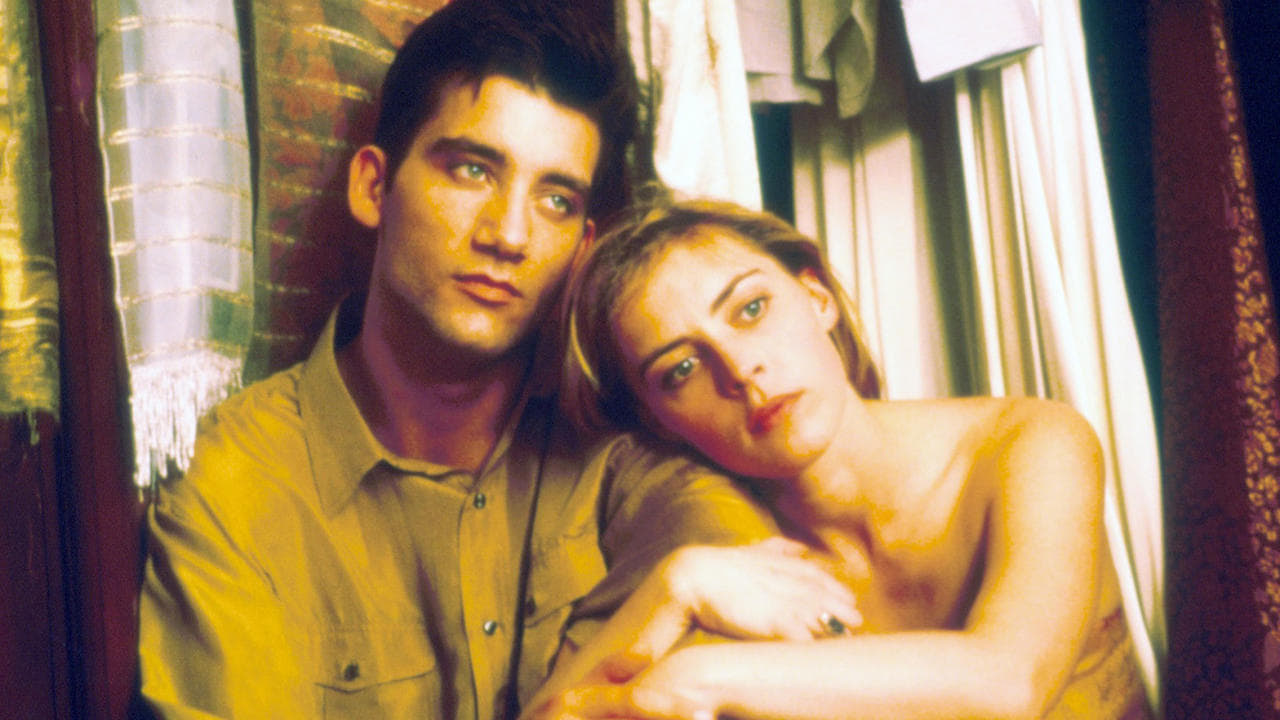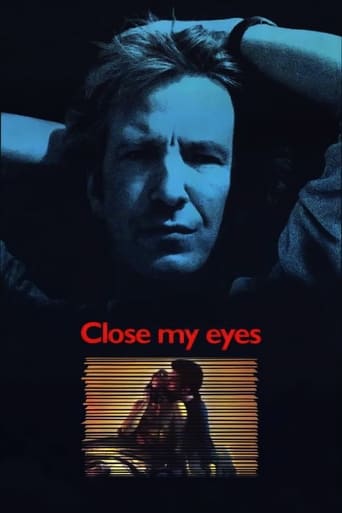



Best movie of this year hands down!
How wonderful it is to see this fine actress carry a film and carry it so beautifully.
View MoreThrough painfully honest and emotional moments, the movie becomes irresistibly relatable
View MoreIt's the kind of movie you'll want to see a second time with someone who hasn't seen it yet, to remember what it was like to watch it for the first time.
View MoreClose My Eyes is a mild and genteel examination of sibling incest amid the London yuppie set and against the backdrop of riverside redevelopment along the Thames. Natalie Gillespie (Saskia Reeves) is an unhappy woman of working class roots. We know this from a quick moving opening sequence of brief scenes that covers five years of her dissatisfied love relationships whining to her ambitious sexy brother, Richard, who she is distanced in age and personality. Richard Gillespie (Clive Owens), is a studly young architect, outgoing unlike his sullen sister, and able to successfully pursue his intellectual and creative pursuits. After a shared late night kiss, reality was quickly passed over as simply cuddling until Natalie rekindles her relationship with the long absent brother dearest. Superior performances by Alan Rickman in easily one of his most sympathetic roles grounds the erotic performance of Clive Owen, who is naked for extensive portions of the movie. They surround Saskia Reeve's performance with sufficient testosterone to overshadow the shortcomings of the secondary story line of Richard's boss who is dying of AIDS. Although meant to have social relevance, incest and AIDS seem an unlikely pairing.The film is a study in contrasts and opposing forces: Alan Rickman's controlled, restrained performance is in total contrast to the fiery passion of the two lovers and the film's direct confrontation with taboos (incest, AIDS, open passion itself) slams against polite society's prevailing opinions. The film dares us to face what is difficult and deal with it in an open and honest way no matter what the consequences, no matter what anyone thinks. The film's solemn conclusion makes clear, however, that this shattering of taboos (what we are not supposed to openly discuss) is no easy accomplishment and involves the possibility of a breakdown in society or "the end of the world." But, the risk is worth it so that nothing is left hidden, so that all is out in the open, on the table, for discussion and acceptance.Overall rating: 8 out of 10.
View MoreAfter some years of tension, Richard begins a sexual relationship with his sister Natalie.Now married, the relationship proves dangerously obsessional.Their private intensity & working class origins contrast with the middle-class, stuffy public scenes we see in the Richmond world into which Natalie has moved with her marriage.As the guilt and intensity of the siblings increases, they seem to be heading for disaster, a foreboding which increases when husband Sinclair suspects her commitment.....Despite the taboo subject, Close my eyes isn't as hard to watch as you may expect. The film isn't very graphic, and it rather concentrates more on the class gap than the sexual tension.Owens obsession could have materialised due to the fact that they are drifting apart in class, Owen is still at his roots, whilst Reeves has moved up a notch since her marriage to Rickman.The film is also about taboo. Obviously the main plot point is taboo, but Poliakov References other things, such as the AIDS victim wanting to share a sandwich and the chap refusing, despite Owen taking a bite.The cast are fantastic, particularly Owen and Rickman, and the narrative is something to get lost in. The film has dated though, it has that Yuppie feel to it that was rife in the UK during the late eighties and early nineties, so it has this really strange cleanliness to it.So all in all, it's a terrific movie about class struggle and coming to terms with change, with the added plot point of incest.
View MoreThe opening scenes of Stephen Poliakoff's film, 'Close My Eyes', are truly mesmerising. We see a floodlit bowling green, incongruously (but, given that one of the subplots of the movie turns out to concern urban planning law, not irrelevantly) positioned amongst tower blocks; meanwhile a young woman (Natalie, played by Saskia Reeves) is smoking a cigarette on a balcony, possibly in one of those same blocks. As the credits fade, the camera homes in on a young man in a hurry (Richard, played by Clive Owen), passing by the bowlers; it turns out that the woman is his estranged sister, and he's late. She, on the other hand, is upset, and looks to him for comfort; and in the middle of the night, they share a moment of affection that goes a little bit beyond what siblings ought to do. The unfolding of their lives over the next few years is then summarised through a depiction of their subsequent (non-) interactions: he is every bit the strident, ambitious, fornicating yuppie; while she feels lost and uncertain, with a brother-shaped hole in her life. But after years abroad, Richard comes home, rather surprisingly to take a lowly paid public sector job. And then Natalie, whom he has almost forgotten, gets in touch and invites him to meet her new husband, Sinclair (played wonderfully by Alan Rickman, in probably his finest role). Sinclair is a millionaire futurologist, a man both kindly, but also child-like in his fundamental inability to empathise. And Natalie, who has gained a new confidence, starts to come on to Richard with a very definite intent. The skill with which the film effectively tells half its story in just a handful of minutes, with brilliantly selected visuals replacing the need for expository dialogue, is breathtaking; one can hardly take one's eyes off the screen.But for all Poliakoff's brilliantly striking imagery, the film manifests some serious defects. To start with, the subsequent plotting doesn't quite work. The central idea appears to be that ambitious Richard falls in love with his sister, but she is only game-playing; he then falls apart. But the film keeps its distance from its characters, sometimes their motivation (beyond raw sexual passion) is unclear, and some of their behaviour seems forced to fit the dictates of plot. One could also argue that, in dealing with incest, the film is slightly dishonest. It wants to be seen to explore a taboo, but creates a scenario in which two consenting, independent adults find themselves in a very unusual situation: to put it another way, the reason incest is taboo is because it is almost invariably exploitative, whereas this relationship is not (at least, not in the way that generally characterises the phenomenon).Another aspect of this movie is Poliakoff's decision to set his movie in a landscape more symbolic than real. We witness the progression of an almost supernaturally idyllic affair, made even more perfect by being set in contrast to the spectre of A.I.D.S. Sexual intercourse takes place between beautiful bodies disrobing from beautiful clothing in beautiful places. Alan Rickman plays the sort of eccentric genius whom we instinctively feel is exactly what a millionaire should be like, though in reality, one suspects, most are none of the sort. Even the supposedly wretched council offices where Richard takes up his new job have more the feel of a trendy design consultancy than of grim municipal poverty. More generally, Poliakoff's films invariably set up contrasts between worlds defined by qualities such as power, sex, or tradition; but never seem to recognise that all these qualities, far from being opposites, are just different attributes that identify some as the "haves" of our society, as opposed to the "have-nots". There are a few images of the homeless, of the truly dispossessed, in this film, but they only exist as images; while the real drama plays out within a gilded circle. In some respects, it's this romantic other-worldliness that makes the film so physically striking. But social realism it ain't.Does this make it a bad film? On the contrary, one could say it's a great film. But the roots of Poliakoff's later disaster, 'The Tribe', are clearly on show here, alongside evidence of his rare gift for combining intelligence and beauty, in this fascinatingly flawed film.
View MoreWhile Alan Rickman is perhaps one of the best actors around, this movie was NOT a vehicle that promoted him in any way, except to have him come in and out for those tension moments. A great actor like Rickman needs a stronger role to bring out his various talents in acting. This was a vehicle for Owen and his sister instead.I hated this movie immensely, even with Alan Rickman in it (he is the only reason I saw it). Clive Owen, as nice looking as he is, was slimy in going after his sister, and his sister was even slimier for giving in. Incest is NOT a topic that ingratiates itself with viewers, unless they are morally deplorable in the first place. This is a movie you should watch with your eyes closed. Meaning, why bother watching it?
View More